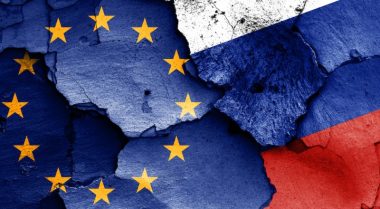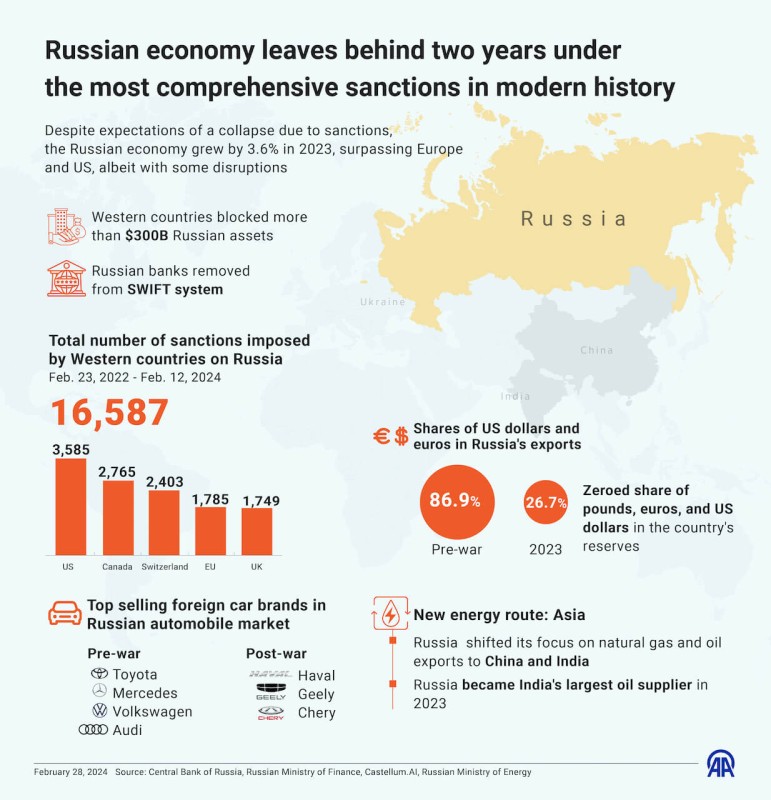The Russia-Ukraine war marked a watershed moment in relations between the European Union (EU) and Russia, which had previously been strained by the Georgian war and Russia’s annexation of Crimea. Post-Cold War efforts to improve EU-Russia relations through trade and dialogue have not succeeded in transforming Russia politically into the democratic regime the EU desired. On the contrary, the Russian political regime has embarked on an expansionist policy of violating the independence and sovereignty of countries in the former Soviet geography and sphere of influence by military force. This has led key EU countries such as Germany and France to reassess their approach to Russia.
The EU countries, which somehow maintained relations with Russia after the war in Georgia (2008) and the annexation of Crimea (2014), realized that Russia’s expansionist policy would not stop with the invasion of Ukraine on February 24, 2022, which Russia announced as a “special military operation”. We have begun to observe that a new approach to the EU’s relations with Russia has been adopted in this process.
The swift imposition of EU sanctions against Russia was the first step in this new approach. Against the possibility that this coercive measure would fail to convince Russia to make peace and that this war would spread to other parts of Europe, Germany’s decision to increase its military capacity with a fund of 100 billion euros, announced by German Chancellor Olaf Scholz on February 27, 2022 as a turning point (Zeitenwende), signaled a serious transformation.
The EU’s strategic autonomy in the field of defense, which gained momentum with the adoption of the Strategic Compass in March 2022 when France held the rotating presidency of the European Union, was accelerated by the two-year Russia-Ukraine war and the growing needs in the field of defense. Steps have been taken to support this with new policies, programs, and funding.
Another step in this direction was the decision to establish the European Sky Shield Initiative (ESSI), led by Germany and including Turkey, to create a defense shield with missile defense systems against Russian aggression from the Baltic to the Black Sea. The reasons behind this move are the increased importance of missile defense systems based on the lessons learned from Russia’s attacks on Ukraine’s infrastructure and Russia’s deployment of Russian hypersonic missiles in Kaliningrad, between Lithuania and Poland, in August 2022.
The EU’s Defense Needs
Among the reasons why the EU has taken steps to strengthen its defenses in recent years: the growing perception of the Russian threat, the U.S.’ reluctance to defend its European allies against Russian threat if former U.S. President Donald Trump is re-elected in the upcoming U.S. elections in November, and the EU’s lack of self-sufficiency, which has become more visible with the Russia-Ukraine war.
The Russia-Ukraine war has shown that the need for military ammunition is an urgent necessity for Ukraine. The support of NATO allies is essential for Ukraine to overcome the ammunition shortage. It is predicted that the more Ukraine’s military ammunition shortage grows, the more Russia’s gains on the ground will increase. To prevent this from happening, the EU has made some decisions on military assistance to Ukraine. One of them was to produce more ammunition for Ukraine. In order to increase EU production, the Act in Support of Ammunition Production (ASAP) came into force in July 2023.
However, this law does not change the fact that the European defense industry does not have sufficient stocks to meet Ukraine’s demand for ammunition in a short period of time. In other words, the Russia-Ukraine war has left EU defense production unable to replenish depleted military stocks and meet the pace needed to support Ukraine. The main reason for this ammunition problem is that EU defense industry production is based on a peacetime economy, not a wartime economy. Shifting to a wartime economy means shifting a significant portion of the budget from other areas to defense.
At this point, the EU adopted the European Defense Industry Strategy (EDIS) to address these concerns. Based on the results of the defense investment gap analysis and an extensive consultation process, the first European Defense Industrial Strategy, entitled “First ever Defense Industrial Strategy and a New Defense Industry Program to Enhance Europe’s Readiness and Security”, was presented by the European Commission and the EU’s High Representative on March 5, 2024.
Keeping production going and building industrial confidence through ambitious targets is an important part of this strategy. The strategy also calls for EU countries to work together to purchase at least 40 percent of defense equipment by 2030, to spend at least half of their defense procurement budgets on products made in Europe, and to trade at least 35 percent of defense goods between EU countries instead of with other countries. The strategy is intended to help make the EU more secure and resilient and would also benefit key allies such as Ukraine.
The Cost of Energy Security
Besides providing ammunition to Ukraine, French President Emmanuel Macron recently mentioned direct military support and readiness for a major war in Europe. All these discourses should also be read in the context of Russia’s moves in Africa and the price it is paying for France’s energy security. France, which gets a significant part of its energy from nuclear power, also gets a significant part of its uranium, the fuel for nuclear power, from Africa. After the coup in Niger, pro-Russian Niger’s decision to suspend uranium exports to France increased France’s discomfort with growing Russian influence in the region.
Recommended
Moreover, the search for an alternative natural gas supplier to Russian gas and to reduce energy dependence on Russia was further intensified by the Russia-Ukraine war. As a result, the search for natural gas from Africa gained momentum. The planned Trans-Saharan Gas Pipeline, which would transport Nigerian natural gas through Niger and Algeria to Europe, appears to have been blocked by Russia. As France is squeezed by Russia’s strategic moves in Africa, we observe President Macron’s assertive statements, the steps taken to strengthen the defense industry, and finally, as an alternative to endangered energy supplies in Africa, France is turning to one of the world’s largest uranium producers such as Kazakhstan.
Some EU members, led by France, want nuclear energy to be widely used in Europe to combat climate change, and nuclear energy is seen as the main alternative to eliminate energy dependence on Russia. Against this backdrop, the first Nuclear Energy Summit was held in Brussels on March 21, 2024, and proposals were made to promote the use of nuclear energy.

VIDEO: Could a Russia-Nato War Really Happen?
Overall, France and Germany are convinced of the possibility of a major war by Russia. And for that, they believe, Europe must be ready. EU leaders met in Brussels on March 21-22 to discuss security and defense issues, including enlargement, migration, and agriculture, as well as continued support for Ukraine in the ongoing Russia-Ukraine war. Among the issues discussed was the use of money from Russian assets to buy weapons for Ukraine. And, of course, there was the question of putting the EU into a “war economy mode”.
Having found itself in the Kantian Paradise of perpetual peace after the Cold War, the EU has now woken up to the reality of the Hobbesian anarchic world. The non-military foreign and security policy instruments it used in the Kantian Paradise are inadequate to deal with today’s realities. The most important step in the EU’s turn to military power seems to be the transition to a “war economy mode”.







